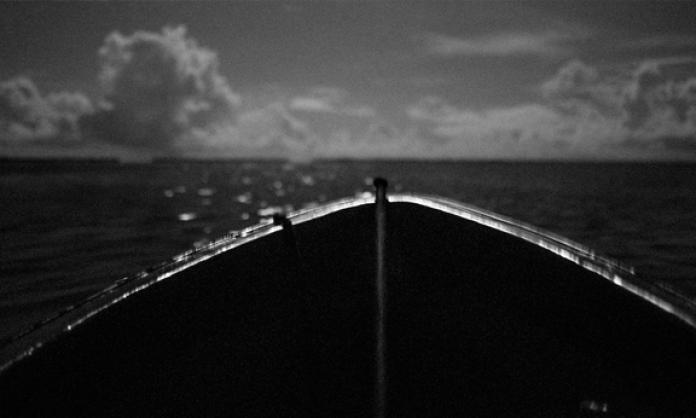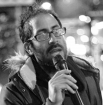At a rally early last month in Sydney, the crowd heard from a refugee on Manus Island, Walid Zazai, who repeated a painfully simple refrain: “We are human beings”. The words have refused to be forgotten, reverberating and cascading as the conditions on Manus worsened.
The significance of the statement is its rejection of the idea that the refugee issue is best understood in terms of borders and security. In four short words it does what the Labor so-called opposition has refused to do: sweep away the cynical lies about people smugglers and boat turn-backs. It reveals the moral depravity at the heart of Australia’s refugee policy. Our government is inflicting indescribable physical and psychological pain on totally innocent people. It is trying to crush their humanity.
Footage from the eviction of the camp last week captured the violence that refugees on Manus have been subjected to on a daily basis for over four years. Guards attacked detainees with poles and batons, before herding them onto buses and shunting them to three new prisons. Their possessions were trashed to break their spirit, their group was split to break their resistance, their journalists were arrested to silence their voices. To add insult to injury, one of the stray dogs on the island that had been adopted by the refugees was killed in the transition, thrown off a bus while it was driving at full speed.
This is not the first time a government has acted in this way. We are bombarded daily with stories and statistics about inequality, injustice and death. It is hard not to be numbed by it all. Yet the indomitable courage and resistance of the detainees on Manus has wrenched the hearts of so many, demanding solidarity from those who are paying attention. They have woken us up.
In order to challenge these atrocities, we must first understand the system that gives rise to them.
Racism
We know why those who run capitalism periodically decide to implement policies of such infinite cruelty. The working class is the majority of society, our exploiters just a small fraction. The ruling class requires divisive ideas such as racism to maintain its domination over the rest of us.
Racism and nationalism have been growing in recent years, in the aftermath of one of capitalism’s greatest economic crises. We know from history that racism thrives in times of economic uncertainty and political instability, when the bosses have little else to offer us.
But we must do more than correctly analyse this appalling situation. We must feel and understand the consequences of this state of affairs. Every death at sea or in detention, every murderous war, every Indigenous teenager murdered by police and every hijab-wearing woman attacked on a train is a monument to a bleak and broken system.
We must understand the psychology of those who are prepared to go to such lengths. Dutton and Abbott are our most ruthless foes, but they are far from the only ones.
In Turnbull’s bigotry we see a manifestation of the indifference of capitalists across the world, who care for nothing except profit and power.
In Shorten’s complicity we see the cowardice of the moderate reformer prepared to trade the lives of innocents to prove his loyalty to the system and get his chance to take the reins.
These people need to be routed, the politics they represent crushed.
Alienation
How and why do ordinary people get conned into supporting or tolerating what is transpiring on Manus right now? The facts are undeniable. Only one-third of Australians support better policies towards refugees. On the day of the eviction, it was surreal seeing so many going about their regular lives while this colossal crime was unfolding. This vast ocean of indifference can easily transform well-meaning activists into islands of rage and despair.
Just like the refugees on Manus, we cannot be truly human as long as this system prevails. We are cogs in a machine, numbers in a spreadsheet, figures on a chart. Like the refugees, we are categorised, manipulated and exploited in regular times, controlled, pacified and brutalised when we try to resist.
It is tempting to keep our heads down and try to survive as best as we can. Squabbling over the scraps that the capitalists let fall from their tables can seem to be a more realistic strategy than demanding more for everyone. This widespread acceptance of racism and refugee bashing reflects a politics of despair, tacitly encouraged by decades of right wing leadership of the workers’ movement, which has offered no alternative to collaboration with the bosses and their neoliberal state.
This affects even those who don’t actively support mandatory detention. We’ve seen turnouts of hundreds, and in some cases thousands. But nowhere have we achieved the tens of thousands that the heroic resistance on Manus deserves. Left wing cultures have been weakened, the idea of standing shoulder to shoulder with people struggling for their freedom has been lost to a large extent.
Compounding these difficulties is the regularity with which we are exposed to brutality under capitalism, a desensitising process that encourages passivity in the face of new horrors. The growth in prison and police numbers – strengthened by moral panics and an endless series of law and order spin-offs – has normalised extreme levels of surveillance and repression. None of these issues can be resolved without the abolition of the state machine.
Propaganda
Finally, the media. What can be said about this despicable institution that has not already been repeated a thousand times? Media that more furiously condemned the tearing of a millionaire’s jacket than the deliberate poisoning of refugees’ water supplies on Manus. Media that grant endless airtime to Dutton and Hanson while refugee advocates are only ever mentioned in the same sentence as “violent scenes”. Media that would prefer to discuss cricket scores rather than the systematic brutalisation of more than 600 people who came to us seeking help.
It is an understatement to say that the complicity and cynicism of the Manus coverage have been breathtaking, but this is a lesson that has been learnt by generations of radicals. Malcolm X famously warned, “If you’re not careful, the newspapers will have you hating the people who are being oppressed, and loving the people who are doing the oppressing”. We must take seriously the consequences of this analysis. The corporate media are our sworn enemy; we should never limit our tactics and strategies to gain their approval. This is why the determined protest against a Liberal Party fundraiser in Sydney, the defiance of police in Melbourne and other creative and militant actions around the country in November have been so important and inspiring.
On a similar note, we must develop our own media to combat their lies. Red Flag is one attempt at doing that, but there are others worthy of support as well. Supporting these projects is crucial to building a movement that is genuinely independent from the ruling class.
Resistance
It is remarkable that, despite all these real challenges, the resistance by activists on Manus has been acknowledged and supported by many thousands of people across Australia. There is hope after all; the ruling class has never found a way to crush totally the solidarity of ordinary people.
The diverse actions organised by a range of groups and individuals have had an impact, with many refugees repeatedly expressing their appreciation for our solidarity, indicating it has kept them going in their darkest hours. This gratitude is both incredibly humbling and a powerful argument to maintain our protests. Our resistance in the major cities has also helped to keep Manus in the media, given the establishment’s desire to bury the issue.
But so far, we have been too few in number and too weak in organisation to overcome the government’s intransigence, let alone deal with the broader issues of racism, nationalism and economic injustice that underpin the global refugee crisis.
We cannot let this temporary weakness on our part lead to passivity or resignation. We must throw ourselves into the movements for refugee rights. There is no alternative. We must take our lead from the men on Manus who, in the most hopeless of situations, despite being battered and bruised from the forced relocation, resumed their daily protests as soon as they arrived in their new camps.
At the same time, we need to commit ourselves to rebuilding a socialist movement that can eventually overthrow the brutal hierarchies of control and exploitation that we experience on a daily basis.
Only when every last detention centre, prison and border has been abolished, only when we collectively consign capitalism to the history books, can we possibly know what it is like to be truly human.









